Gender & Arms, Sexual Violence Debate & latest resources- PeaceWomen Enews April 2013 -
If you have any difficulty reading this newsletter in HTML, please view it online.
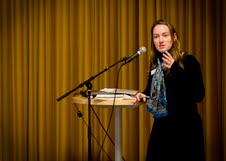
This month has been another busy one with the adoption of the Arms Trade Treaty (ATT) and the Open Security Council Debate on conflict-related Sexual Violence. We also saw the G-8 countries endorse a declaration on preventing sexual violence.
On April 2nd, States (by majority, not consensus) adopted the first ever Arms Trade Treaty (ATT). It includes a legally binding criterion on preventing gender-based violence (GBV) which makes it part of the mandatory export assessment process. As part of the risk assessment process, States will be required to take into account the risk of the weapons, ammunition, parts, or components being used to commit or facilitate serious acts of gender-based violence or violence against women and children. This creates a platform for prohibiting the transfer of arms, if there is a risk they will be used to facilitate GBV.
From PeaceWomen's perspective, the GBV provision is not perfect, but it is certainly much stronger than the extremely weak language in previous drafts. We, as civil society, can and will move forward with implementation. (See our summary of ATT and Gender here>>) I have hailed the inclusion of this GBV provision as historic. I also know without the enormous amount of work by key colleagues and bridge builders within WILPF and our partner organizations that we would not have this provision to work with going forward. I recall sitting in a café close to the UN with Ray (Director of WILPF disarmament work) and Rebecca (then of IANSA-Women Network) plotting our earlier engagement in the ATT process from a gender perspective. Right then, I committed PeaceWomen to work on this (without any funding) because I believed it was critical to link preventing armed violations against women (VAW) and implementing a women, peace and security agenda.
One step led to the next: a joint policy paper; a side event with the CEDAW Committee; one article to another; a State champion in Iceland. The small meetings and the mountain of emails continued, our campaign “Make it Binding” grew, the advocacy strategy evolved, the politics changed, and at some points we achieved great strides towards our end goal. At others, we hit dead-ends but that did not slow down our momentum, as we journeyed from the prep conferences to the first negotiation conference in July 2012 through the final negotiations last month. Together all these approaches and efforts (as well as other ones I am not aware of) resulted in the final Treaty Text including an important provision on GBV and VAW. I believe that without WILPF's advocacy and work at the international and national level, the Treaty would have been gender-blind or worse, it would have undermined existing international law.
102 States supported our position to strengthen the GBV provision during the March negotiations. Before I walked over to the Group of Friends on Women, Peace and Security meeting last week at the Canadian Mission to the UN, I took out the list of WPS Friends (43 member states) and the list of 102 states who supported strengthening GBV in the ATT. Do you think all, or at least most, of the “friends” would have supported the ATT GBV provision? I had thought the numbers would be close. But in fact, only 70% matched up. This provides a challenge and an opportunity for WILPF to close this gap. Who are those so-called friends of 1325 who didn't provide support? Bangladesh, Chile, Colombia, Japan, Jordan, Rep of Korea, Morocco, New Zealand, Philippines, Singapore, Tanzania, USA, and Zambia. This requires some further analysis and is an issue PeaceWomen will take up in the upcoming weeks.
This week, on Wednesday 17th, the Security Council met to discuss sexual violence in conflict. The Special Representative on Sexual Violence, Zainab Bangura, briefed the Council on the latest Report and discussed key country situations of concerns including DRC Congo, Central African Republic and Somalia. We, as members of the NGOWG, made a statement delivered by a women's rights leader from Mali, Saran Keita Diakite, calling on States to address root causes, women's participation and equality; prevention; response; accountability; and resourcing. Overall, this debate was less politically contentious than the previous debate on Sexual Violence (Feb 2012) and there were very limited new aspects to the statements delivered. New references included support for the GBV provision in the ATT and reference to the recent G-8 declaration on sexual violence. It seems that the Security Council will now work on a possible resolution on sexual violence to be adopted later this year, perhaps under the UK Presidency in June (details and content still emerging). For PeaceWomen full analysis of the Debate, see our Security Council Monitor page.
The world's eight wealthiest countries (G-8: France, Germany, Italy, Japan, UK, US, Russia and Canada) have also taken up a focus on rape during times of war and recently adopted a declaration. The UK initiative led by UK Foreign Minister, William Hague, has several aspects: a team of experts who can be deployed to conflict-affected countries to support national investigations; an international protocol to provide clear guidance on gathering and documenting evidence; and the declaration of rape and serious sexual violence's "grave breach” of the Geneva convention. Practical and political commitment to fighting sexual violence and to promoting women's rights must be welcomed. But is the G-8 the proper and most effective forum to address gender justice and equality? Is this transforming accountability for violence against women or about politics? Many of these questions remain open and will continue to be discussed as the UK pushes forward with their initiative and a possible resolution on Sexual Violence in the Security Council later this year.
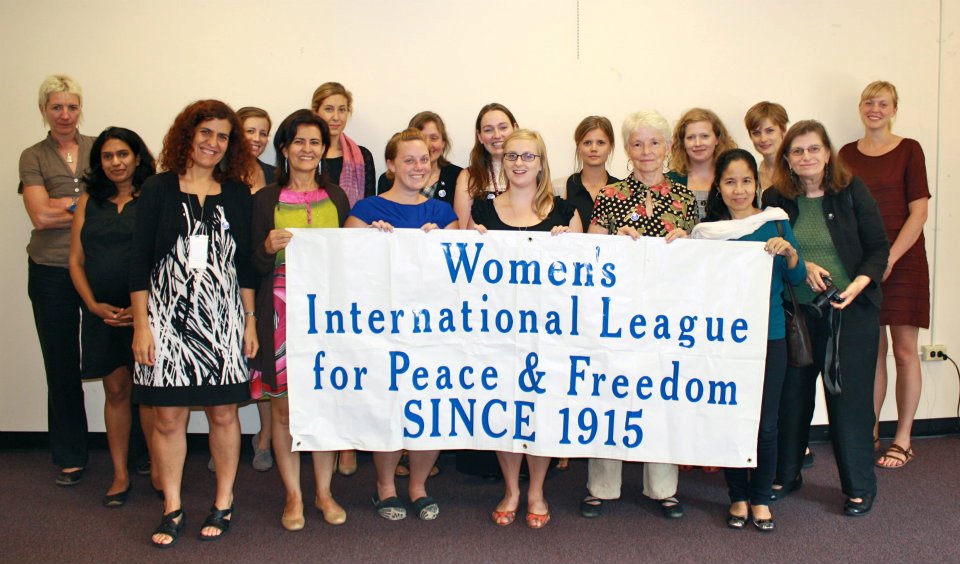 In this edition of Enews, we feature a recent news article on the historic passage of the Arms Trade Treaty and on the G-8 reaching an agreement to end rape as a weapon of war. Under initiatives, we feature WILPF's Press Release on the ATT and a blog on violence against indigenous women. Additionally, we include a resource on the Monthly Action Points on Women, Peace and Security and another resource on PeaceWomen Final Report and Summary of Events from CSW 57.
In this edition of Enews, we feature a recent news article on the historic passage of the Arms Trade Treaty and on the G-8 reaching an agreement to end rape as a weapon of war. Under initiatives, we feature WILPF's Press Release on the ATT and a blog on violence against indigenous women. Additionally, we include a resource on the Monthly Action Points on Women, Peace and Security and another resource on PeaceWomen Final Report and Summary of Events from CSW 57.
Finally, on behalf of PeaceWomen, we extend our thoughts and solidarity to all who have been affected by senseless violence in recent weeks and hope that our collective spirit and work for peace will prevail.
This will be my last editorial for a few months, as I will be on maternity leave to welcome a new human into the world. Abigail Ruane will be assisting PeaceWomen in my absence and we welcome her to the team. (Contact: abigail@peacewomen.org).
ATT- We Made It Binding!
On April 2, 2013 governments adopted the text of the first ever Arms Trade Treaty (ATT) at the United Nations in New York.

The treaty, which prohibits the sale of arms if there is a risk that the weapons could be used to commit or facilitate serious violations of international humanitarian or human rights law, is the first treaty that recognizes the link between gender-based violence and the international arms trade.
The final UN negotiating conference failed to adopt the text by consensus on 28 March due to objections from Iran, Democratic People's Republic of Korea, and Syria. In response, over 100 countries co-sponsored a draft General Assembly resolution calling for the adoption of the treaty text, which was successfully adopted on the 2nd of April.
The Women's International League for Peace and Freedom (WILPF) welcomes the adoption of the treaty as a first step towards regulating international transfers of arms. However, our organization cautions that the treaty is not sufficiently robust or comprehensive enough. The risk of legitimizing the international arms trade, especially irresponsible transfers, must be avoided through careful interpretation and implementation.
Click Here for WILPF Press Release
Click Here to Download WILPF Policy Recommendations
Read More about ATT & Gender, click here
CSW 57: PeaceWomen Final Report and Summary of Events
The 57th Session of the Commission on the Status of Women (CSW) took place at United Nations Headquarters in New York from Monday, March 4th to Friday March 15, 2013. The theme of CSW 57 was “the prevention and elimination of all forms of violence against women and girls” – a theme highly relevant to the Women, Peace and Security (WPS) agenda. WILPF had a large delegation coordinated by the PeaceWomen programme with over 70 representatives from every region of the world.
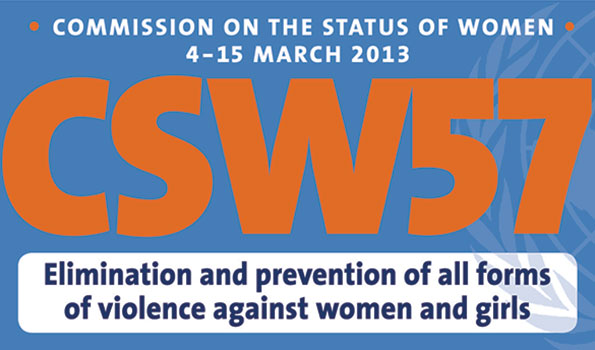 Peacewomen organized and supported an impressive number of events and focused on addressing the root causes of violence against women and underlining the linkages with militarism and gun violence. We worked collectively towards advocacy on strengthening the Agreed Conclusions with a focus on WILPF priority areas for CSW: linkage with arms, women peace and security, and women's participation. In the end, our hard work and activism paid off, unlike last year's CSW, this year the Conference resulted in Agreed Conclusions. PeaceWomen drafted a summary document which details an overview of CSW 57 events and outcomes from a Women, Peace and Security perspective. To Read full report Click Here>>
Peacewomen organized and supported an impressive number of events and focused on addressing the root causes of violence against women and underlining the linkages with militarism and gun violence. We worked collectively towards advocacy on strengthening the Agreed Conclusions with a focus on WILPF priority areas for CSW: linkage with arms, women peace and security, and women's participation. In the end, our hard work and activism paid off, unlike last year's CSW, this year the Conference resulted in Agreed Conclusions. PeaceWomen drafted a summary document which details an overview of CSW 57 events and outcomes from a Women, Peace and Security perspective. To Read full report Click Here>>
Call for Action: 3rd Global Day of Action on Global Military Spending
Women's exclusion from security discussions, forums and disarmament efforts, in addition to excessively overfunded global military budgets directly, links directly to the lack of funding for women's human rights and gender equality. These critical issues were some of the debates highlighted on April 15, 2013, which was designated the Global Day of Action on Military Spending (GDAMS).
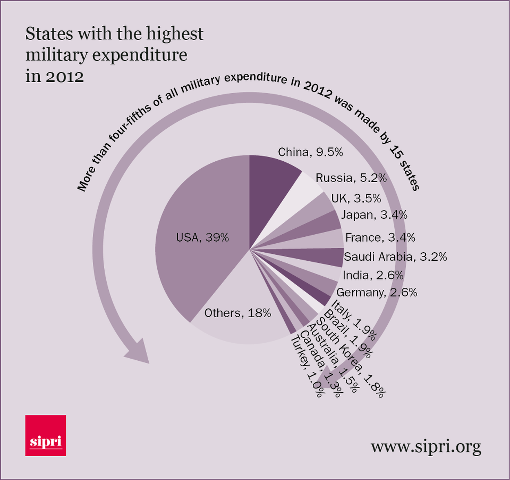
This day coincided with the release of the Stockholm International Peace Research Institute's (SIPRI) annual statistics on global military expenditures and Tax Day in the US.
PeaceWomen Program participated in this Global Day of Action by attending a Panel Discussion on Military Expenditures at UN Headquarters; organized by the UN office of Disarmament Affairs and SIPRI and the Permanent Mission of Japan. WILPF actively participated in GDAMS action as a partner organization of GDAMS network. We took action in Geneva, while other WILPF Sections around the world coordinated their own actions. Read more about WILPF's engagement on WILPF's Statement on GDAMS.
The Global Day of Action was a unifying day of activism for people around the world who joined forces in action to focus political, public and media attention on the human costs of the overfunded global military spending.
For more information read WILPF statement on GDAMS
Security Council Debate on Sexual Violence
On April 17th, the UN Security Council held a daylong debate on Sexual Violence in Conflict under the Women, Peace and Security agenda. Member States discussed the Secretary-General's annual report (S/2013/149) followed by briefings by the Secretary General Ban Ki-moon and Zainab Bangura, Special Representative on sexual violence. Additionally, Saran Keita Diakite – the President of the Women, Peace and Security Network of the ECOWAS region, Mali – spoke on behalf of the NGO Working Group on Women, Peace and Security. Ms. Diakite (NGOWG) said: “the prevention of sexual violence – and of the underlying causes of conflict itself – is the most powerful instrument available to us” and highlighted the inclusion of a gender criterion in the recently adopted Arms Trade Treaty that WILPF strongly advocated for. Several States including France, Australia, Lichtenstein, Estonia, Kazakhstan, Brazil, Chile and other also referred to the recently adopted Arms Trade Treaty that included a gender criterion.

The debate featured 60 statements and was presided over by Louise Mushikiwabo, the Foreign Minister of Rwanda. Overall, it was less politically contentious than the previous debate on sexual violence in conflict (February 2012). The situations in Syria, Mali, DRC, South Sudan and Somalia were among the frequently mentioned contexts. Although there was no outcome document of this meeting, the debate seems to be a starting point for a possible Security Council resolution later this year on Sexual Violence.
For Full Debate Summary, click here>>
Applying a Disarmament Lens to Gender, Human Rights
On Tuesday April 9th, the United Nations Office for Disarmament Affairs, in cooperation with Global Action to Prevent War launched the publication, “Applying a Disarmament Lens to Gender, Human Rights, Development, Security, Education, and Communication: Six Essays”, with a panel discussion at the United Nations. The panelists discussed the crosscutting nature of human rights, gender equality and disarmament, which are oftentimes treated as separate issues both within the UN and civil society. There is a dire need to shift the framework from the status quo of separating them towards emphasizing their interconnectedness.
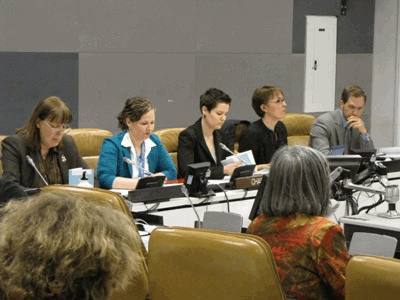
Ray Acheson of WILPF's Reaching Critical Will, highlighted WILPF's work on the linkages between military spending, trade in arms and the lack of funding for gender equality, poverty reduction and development initiatives. Acheson also stressed the significance of the inclusion of gender-based violence as a legally binding criterion within the ATT – and how this was achieved by cooperation between governments and NGOs. Sarah Taylor, NGO Working Group on WPS, spoke about understanding disarmament, demobilization and reintegration (DDR) from a gender perspective, using the Women, Peace and Security agenda. Taylor argued that integrating women and gender to DDR processes really means a whole new way of thinking about it.
To read full summary of event, click here >>
To read the full publication, click here>>
How We Made it Binding
On April 2, 2013 governments adopted the text of the first ever Arms Trade Treaty (ATT) at the United Nations in New York. The treaty, which prohibits the sale of arms if there is any risk that the weapons could be used to commit or facilitate serious violations of international humanitarian or human rights law, is the first treaty that recognizes the linkages between gender-based violence and the international arms trade.
The final UN negotiating conference failed to adopt the text by consensus on the 28th of March due to objections from Iran, Democratic People's Republic of Korea, and Syria. In response, over 100 countries co-sponsored a draft General Assembly resolution calling for the adoption of the treaty text, which was successfully adopted on the 2nd of April.
The Women's International League for Peace and Freedom (WILPF) welcomes the adoption of the treaty as a first step towards regulating the international transfers of arms. However, our organization cautions that the treaty is not sufficiently robust or comprehensive enough. The risk of legitimizing the international arms trade, especially irresponsible transfers, must be avoided through careful interpretation and implementation.
Click Here for WILPF Press Release
Click Here to Download WILPF Policy Recommendations
Read More Click Here
